Unit 6 Do you like bananas?Section A(2d – 3c) 课件(共19张PPT)
文档属性
| 名称 | Unit 6 Do you like bananas?Section A(2d – 3c) 课件(共19张PPT) |

|
|
| 格式 | ppt | ||
| 文件大小 | 335.5KB | ||
| 资源类型 | 教案 | ||
| 版本资源 | 人教新目标(Go for it)版 | ||
| 科目 | 英语 | ||
| 更新时间 | 2022-09-12 00:00:00 | ||
图片预览

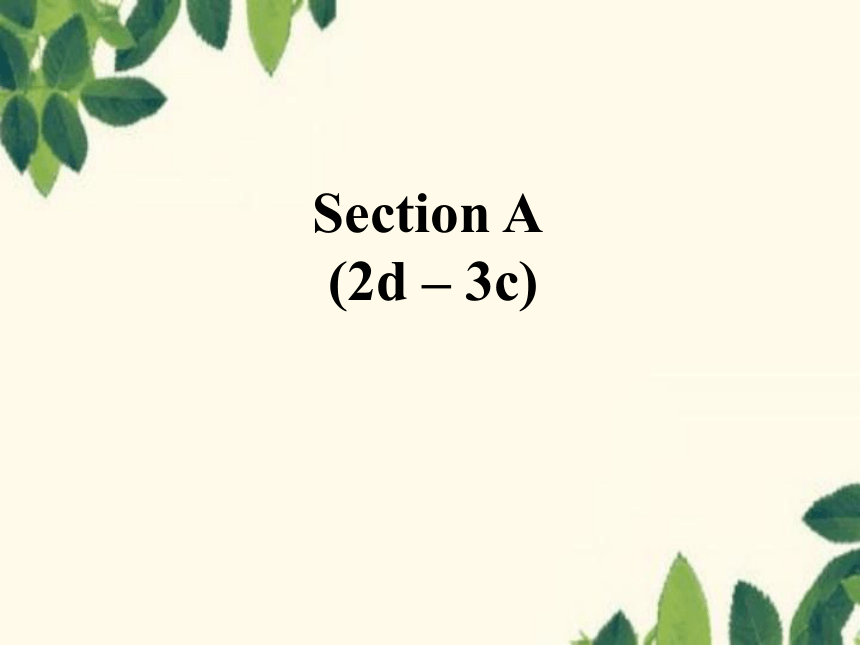
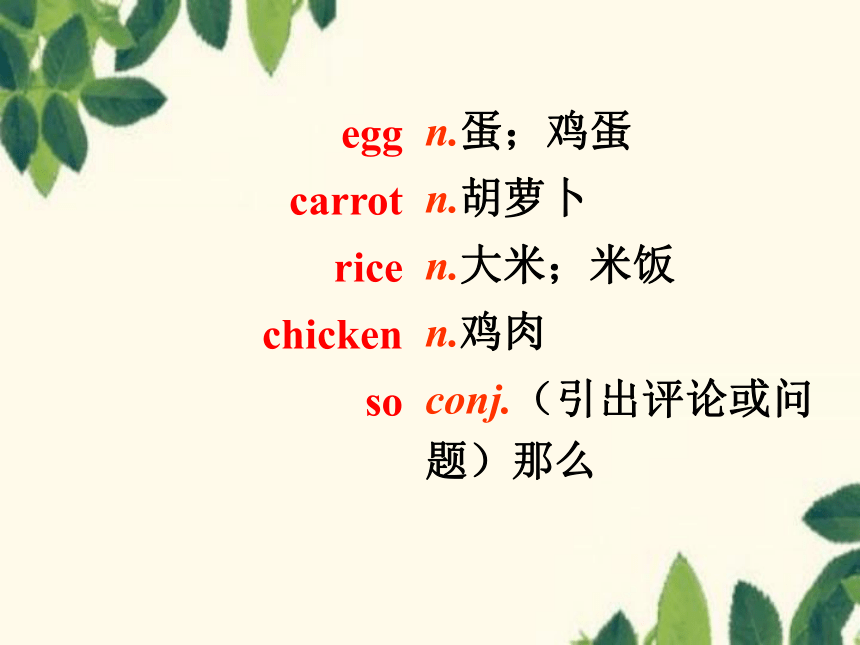

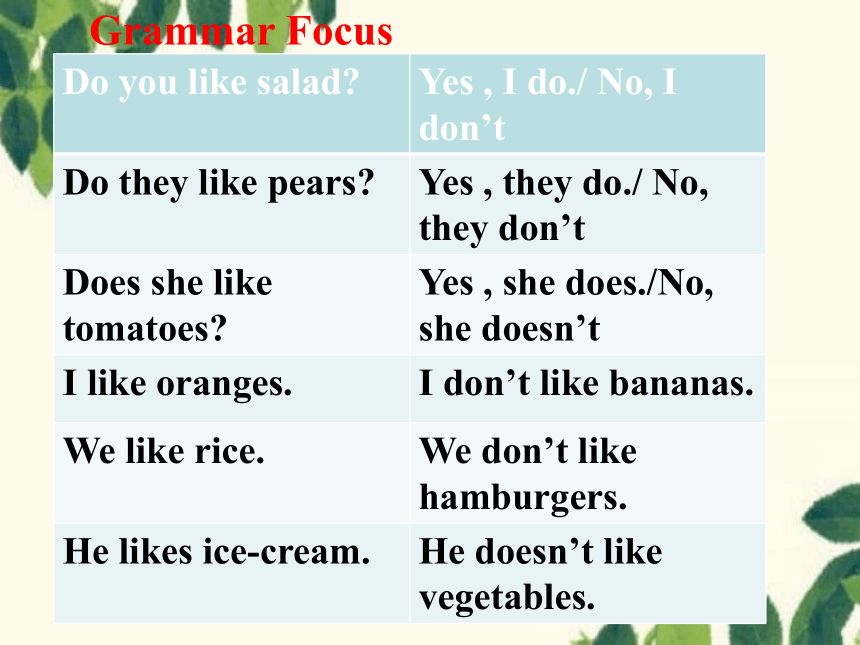
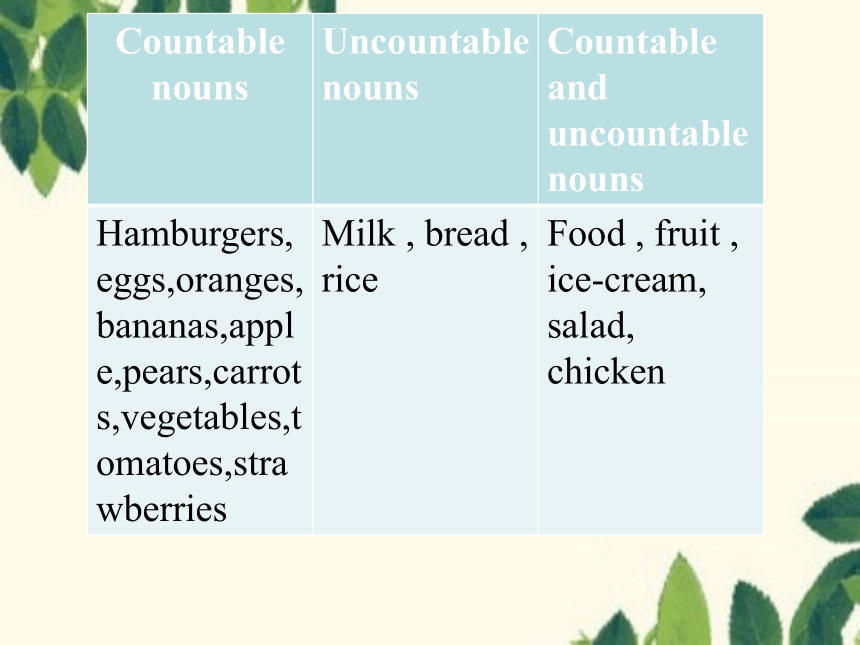
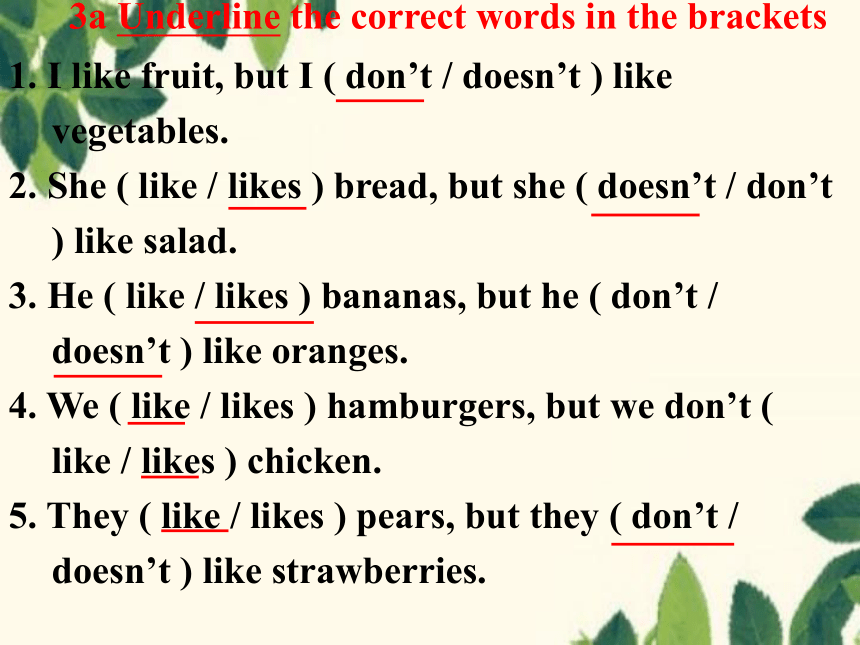
文档简介
(共19张PPT)
Unit 6
DO you like bananas
Section A
(2d – 3c)
egg
carrot
rice
chicken
so
n.蛋;鸡蛋
n.胡萝卜
n.大米;米饭
n.鸡肉
conj.(引出评论或问题)那么
2d Role-play the conversation
Jack: Hey, John’s birth day dinner is next week.
Let’s think about the food.
Tom: Sure. How about burgers, vegetable
salad, and some fruit
Bill: Sounds good.
John likes hamburgers.
Jack: Oh, I don’t like salad.
Bill: But John likes salad,
and it’s his birthday.
Jack: Yes, you’re right. What about the fruit
Tom: I think John likes strawberries and apples.
Bill: OK . Let’s have strawberries and apples then.
Grammar Focus
Do you like salad Yes , I do./ No, I don’t
Do they like pears Yes , they do./ No, they don’t
Does she like tomatoes Yes , she does./No, she doesn’t
I like oranges. I don’t like bananas.
We like rice. We don’t like hamburgers.
He likes ice-cream. He doesn’t like vegetables.
Countable nouns Uncountable nouns Countable and uncountable nouns
Hamburgers,eggs,oranges,bananas,apple,pears,carrots,vegetables,tomatoes,strawberries Milk , bread , rice Food , fruit , ice-cream, salad, chicken
3a Underline the correct words in the brackets
1. I like fruit, but I ( don’t / doesn’t ) like vegetables.
2. She ( like / likes ) bread, but she ( doesn’t / don’t ) like salad.
3. He ( like / likes ) bananas, but he ( don’t / doesn’t ) like oranges.
4. We ( like / likes ) hamburgers, but we don’t ( like / likes ) chicken.
5. They ( like / likes ) pears, but they ( don’t / doesn’t ) like strawberries.
3b Number these sentences [ 1-4 ]
to make a conversation.
So, let’s get salad.
Yes, I do.
Do you like salad
OK.
1
2
3
4
3c Ask your classmates about the food in the chart.
Food Likes dislikes
ice-cream Liu Li Zhao Jun
tomato
hamburger
strawberry
milk
chicken
salad
bananas
Find out what they like and don’t like.
1. John’s birthday dinner is next week. 约翰的生日晚宴在下周。
表示“某人的生日”要使用名词所有格;next week表示“下周”,英语中含有next的时间短语,其前面是不加介词的,如:
BACK
He will come here next Sunday. 他下周日要到这里来。
2.Let’s think about the food. 我们来考虑一下食物吧。
短语think about表示“思考;考虑”,后接宾语(名词、代词或动词ing形式)
BACK
Let me think about it.让我考虑一下这个问题吧。
He is thinking about going to the park.他正在考虑去公园的事情。
3.I think John like strawberries and apples. 我认为约翰喜欢草莓和苹果。
带有I think的句子变为否定句时,通常变成I don’t think ...,但译成汉语时,否定词常放在后面,
BACK
如原句的否定句是:
I don’t think John likes strawberries and apples. 我认为约翰不喜欢草莓和苹果。
4.Let’s have strawberries and apples then.那我们吃草莓和苹果吧。
本句是由let’s开头的一个祈使句,其中let’s后接动词原形,
BACK
故这里使用了have(吃);但含let’s的句子变为否定句时,则是直接在let’s后面加not构成,如原句的否定句是:Let’s not have strawberries and apples then.那我们不吃草莓和苹果吧。
BACK
5. They like pears, but they don’t like strawberries. 他们喜欢梨,但不喜欢草莓。
(1)连词but用来表示转折,表示前后两个句子的内容在意思上是相反的或是相对的,如:
I like fast food, but he likes healthy food. 我喜欢快餐食品,但他喜欢健康食品。
BACK
(2)水果类名词如果前面没有修饰词时,一定要使用复数形式。
BACK
Unit 6
DO you like bananas
Section A
(2d – 3c)
egg
carrot
rice
chicken
so
n.蛋;鸡蛋
n.胡萝卜
n.大米;米饭
n.鸡肉
conj.(引出评论或问题)那么
2d Role-play the conversation
Jack: Hey, John’s birth day dinner is next week.
Let’s think about the food.
Tom: Sure. How about burgers, vegetable
salad, and some fruit
Bill: Sounds good.
John likes hamburgers.
Jack: Oh, I don’t like salad.
Bill: But John likes salad,
and it’s his birthday.
Jack: Yes, you’re right. What about the fruit
Tom: I think John likes strawberries and apples.
Bill: OK . Let’s have strawberries and apples then.
Grammar Focus
Do you like salad Yes , I do./ No, I don’t
Do they like pears Yes , they do./ No, they don’t
Does she like tomatoes Yes , she does./No, she doesn’t
I like oranges. I don’t like bananas.
We like rice. We don’t like hamburgers.
He likes ice-cream. He doesn’t like vegetables.
Countable nouns Uncountable nouns Countable and uncountable nouns
Hamburgers,eggs,oranges,bananas,apple,pears,carrots,vegetables,tomatoes,strawberries Milk , bread , rice Food , fruit , ice-cream, salad, chicken
3a Underline the correct words in the brackets
1. I like fruit, but I ( don’t / doesn’t ) like vegetables.
2. She ( like / likes ) bread, but she ( doesn’t / don’t ) like salad.
3. He ( like / likes ) bananas, but he ( don’t / doesn’t ) like oranges.
4. We ( like / likes ) hamburgers, but we don’t ( like / likes ) chicken.
5. They ( like / likes ) pears, but they ( don’t / doesn’t ) like strawberries.
3b Number these sentences [ 1-4 ]
to make a conversation.
So, let’s get salad.
Yes, I do.
Do you like salad
OK.
1
2
3
4
3c Ask your classmates about the food in the chart.
Food Likes dislikes
ice-cream Liu Li Zhao Jun
tomato
hamburger
strawberry
milk
chicken
salad
bananas
Find out what they like and don’t like.
1. John’s birthday dinner is next week. 约翰的生日晚宴在下周。
表示“某人的生日”要使用名词所有格;next week表示“下周”,英语中含有next的时间短语,其前面是不加介词的,如:
BACK
He will come here next Sunday. 他下周日要到这里来。
2.Let’s think about the food. 我们来考虑一下食物吧。
短语think about表示“思考;考虑”,后接宾语(名词、代词或动词ing形式)
BACK
Let me think about it.让我考虑一下这个问题吧。
He is thinking about going to the park.他正在考虑去公园的事情。
3.I think John like strawberries and apples. 我认为约翰喜欢草莓和苹果。
带有I think的句子变为否定句时,通常变成I don’t think ...,但译成汉语时,否定词常放在后面,
BACK
如原句的否定句是:
I don’t think John likes strawberries and apples. 我认为约翰不喜欢草莓和苹果。
4.Let’s have strawberries and apples then.那我们吃草莓和苹果吧。
本句是由let’s开头的一个祈使句,其中let’s后接动词原形,
BACK
故这里使用了have(吃);但含let’s的句子变为否定句时,则是直接在let’s后面加not构成,如原句的否定句是:Let’s not have strawberries and apples then.那我们不吃草莓和苹果吧。
BACK
5. They like pears, but they don’t like strawberries. 他们喜欢梨,但不喜欢草莓。
(1)连词but用来表示转折,表示前后两个句子的内容在意思上是相反的或是相对的,如:
I like fast food, but he likes healthy food. 我喜欢快餐食品,但他喜欢健康食品。
BACK
(2)水果类名词如果前面没有修饰词时,一定要使用复数形式。
BACK
同课章节目录
- starters 预备篇(2012秋审查)
- Unit 1 Good morning !
- Unit 2 What’s this in English?
- Unit 3 What color is it ?
- Unit 1 My name's Gina.
- Section A
- Section B
- Unit 2 This is my sister.
- Section A
- Section B
- Unit 3 Is this your pencil?
- Section A
- Section B
- Unit 4 Where's my schoolbag?
- Section A
- Section B
- Unit 5 Do you have a soccer ball?
- Section A
- Section B
- Unit 6 Do you like bananas?
- Section A
- Section B
- Unit 7 How much are these socks?
- Section A
- Section B
- Unit 8 When is your birthday?
- Section A
- Section B
- Unit 9 My favorite subject is science.
- Section A
- Section B
